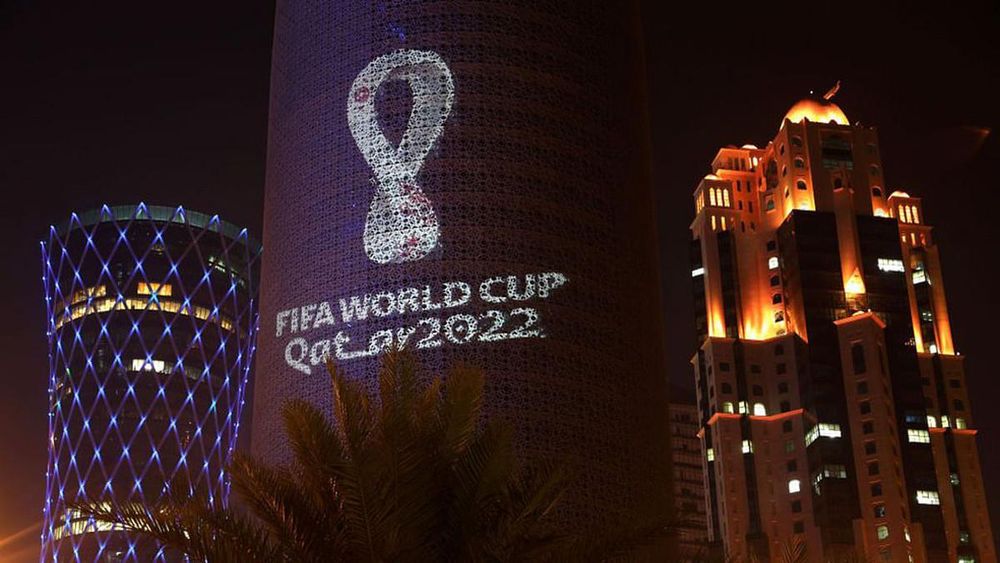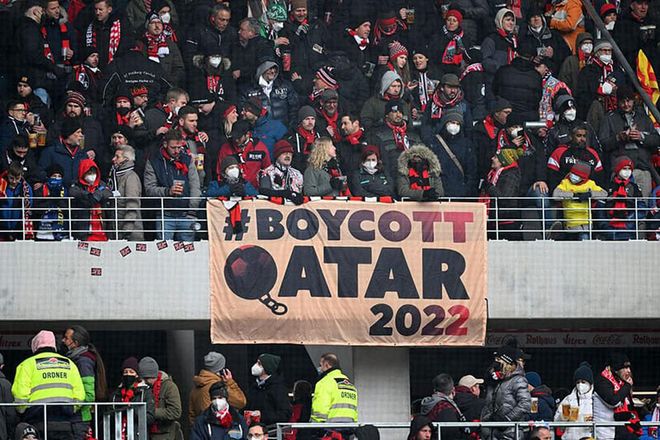Why And How Celebrities Are Boycotting The 2022 World Cup
The soccer tournament kicks off this Sunday in Qatar.

The 2022 World Cup will kick off this Sunday, November 20, in Qatar. The country will host 32 pro soccer teams for 64 matches over 29 days—a first for the Middle East. But despite the historic nature of the tournament, much controversy has risen around it due to Qatar's politics and policies against women, the LGBTQ+ community, and migrants.
The oil-rich Muslim nation has many oppressive laws targeting women and homosexuals, as well as accusations of free-speech censorship and human rights abuses against migrant workers, particularly domestic ones.
Women in the country continue to need their male guardian’s (father, brother, uncle) permission to make key life decisions, including whom to marry; in some instances, where to study, travel, and work; and choices about the reproductive health. Domestic abuse also remains a massive problem.
At the same time, homosexuality, in the year 2022, is still considered illegal in Qatar, and LGBTQ+ people continue to be arrested, beaten, and mistreated by authorities simply for being who they are, per the Human Rights Watch.
This ill treatment has led athletes, celebrities, and fans around the world to boycott the soccer tournament.

Photo: Matthias Hangst / Getty Images
Qatar 2022 World Cup
Related article: The Surprising Way The World Cup Is Influencing Your Wardrobe
Celebrities boycott the World Cup
This past weekend, Dua Lipa released a statement saying she was not asked to perform at the tournament and would not have done so regardless. "I will not be performing and nor have I ever been involved in any negotiation to perform. I will be cheering England on from afar and I look forward to visiting Qatar when it has fulfilled all the human rights pledges it made when it won the right to host the World Cup," she wrote in an Instagram story.
Rod Stewart was invited to perform and offered a million-dollar check, but he turned it down due to the country's human rights record. "It's not right to go," he told The Sunday Times.
Former Spice Girls singer Melanie C also said in the Not My Bagg podcast that she feels "very uncomfortable" showing support for Qatar considering their treatment of LGBTQ+ people. Her comment came amid criticism of Victoria Beckham, a.k.a. Posh Spice's husband, David Beckham, who remains the ambassador of the tournament.
Related article: David Beckham Talks Instagram Rivalry With Son Brooklyn
Fans have repeatedly asked Beckham to step down from the position as a sign of respect for his gay fans, and British comedian Joe Lycett, who is pansexual, even created a website championing the cause. Lycett also said he will donate £10,000 ($11,896) of his own money to charity if the soccer star, whom fans are deeming a "gay icon," withdraws from his role in the tournament.
Amid the ongoing controversy, LGBTQ+ rights researcher at Human Rights Watch Rasha Younes urged Qatar authorities last month to "end impunity for violence against LGBT people." She said, "The world is watching."
Related article: Shakira Teases Heartbreak Song After Split From Gerard Piqué
Who will perform?
Though the full lineup of performers has not been released, musicians confirmed to perform at Qatar's FIFA Fan Festival are Sean Paul and Clean Bandit. K-pop star Jungkook will also lead the show at the opening ceremony at Al Bayt Stadium alongside Robbie Williams. There have additionally been rumors that Shakira and the Black Eyed Peas may perform, but nothing has been publicly confirmed.
Who will attend?
Around 1.5 million soccer fans—approximately 100,000 American—from around the world are expected to converge in Qatar's capital of Doha to attend the tournament. But despite the numbers, the "Boycott Qatar" movement has only garnered more strength—even among professional soccer players heading to the World Cup.
Ongoing protests
Germany's soccer team in March wore T-shirts on the field that spelled out "Human Rights" prior to their qualifying match against Iceland. And in their stadiums during their games, banners spelling out "Boycott Qatar 2022" have become commonplace. The same has been occurring in France and Spain.
"The closer the World Cup gets, the more intense the message is getting," Stefan Schirmer from the Boycott Qatar campaign, said.
The movement has snowballed to the point where earlier this month, German Interior Minister Nancy Faeser—who reportedly criticized Qatar's hosting of the World Cup in October—visited Qatar and said she confirmed with the country's government that German LGBTQ+ visitors attending the tournament will be kept safe.
What will be allowed?
World Cup organizers have insisted all foreign visitors will be welcomed in the country for the tournament.
Though homosexuality is illegal in the nation, they have assured LGBTQ+ fans will not be arrested for holding hands or kissing in public. And while sex between unmarried couples is also against the law in Qatar, the government said foreign unmarried couples will be allowed to share hotel rooms, regardless of their sexuality.
And yet in a strange turn of events, today FIFA announced that beer sales will be banned in the stadium during the World Cup due to the country's strict rules against alcohol consumption.
This article originally appeared on Harper's BAZAAR US.